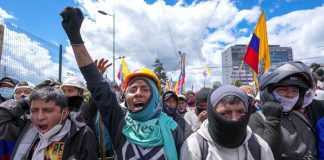After a number of failed attempts, deposed President Manuel Zelaya unexpectedly returned to Honduras in late September and took up residence inside the Brazilian embassy.
Crowds gathered to continue protests against the military coup that overthrew Zelaya on June 28.
While the coup was immediately condemned by everyone from the Organisation of American States to Barack Obama himself, the new government of Roberto Micheletti were invited to Washington and treated with respect.
From then on, the US argued for negotiation between the elected president Zelaya and the new regime.
But Zelaya’s removal has sparked a mass movement of resistance which has prevented any attempt to resolve the situation in the way the US and their Honduran friends would have liked.
Zelaya, a moderate politician, had become identified with change and Latin American solidarity amongst the mass of Hondurans.
Zelaya has suggested a willingness to talk with the new government and might be willing to accept a power-sharing deal. No doubt the price will be to block any further reforms. But it is mass action that has changed the face of Honduras. That is the lesson the US, and Latin America’s ruling elites, fear most.
By Mike Gonzalez
Socialist Worker UK





